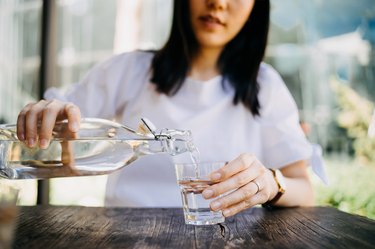
Have a headache from drinking water? This may come up as a surprise, but you might be overhydrated. Drinking too much water can lead to migraines, cramping, fatigue and electrolyte imbalances, among other symptoms.
Tip
A high water intake may dilute sodium in the body and lead to hyponatremia. This electrolyte disorder is often the culprit behind headaches, confusion, fatigue and irritability.
Video of the Day
Dehydration, Overhydration and Headaches
Until recently, health experts recommended drinking at least eight cups of water per day. There is still a lot of debate on how much fluid is needed daily for optimal health.
Video of the Day
The Mayo Clinic, for example, states that water intake depends on age, activity level, overall health, climate and other factors. The National Academies of Sciences, Engineering, and Medicine, on the other hand, recommends the consumption of 11 and a half cups of fluids per day for women and 15 and a half cups for men. Fruits, vegetables, soups and other high-water foods count toward your daily fluid intake. Harvard Health Publishing states that healthy people may drink four to six cups of water daily.
One thing is for sure: drinking too much water can be just as harmful as drinking too little. Both dehydration and overhydration may lead to headaches and affect your overall health.
A low fluid intake, vomiting, diarrhea and intense exercise can all contribute to dehydration. Its symptoms include lethargy, dizziness, thirst, dry mouth and mood swings. Headaches are a sign of dehydration too, according to Harvard Health Publishing.
Drinking too much water isn't better either, as it may lead to hyponatremia, a common electrolyte disorder characterized by low sodium levels in the bloodstream. This condition may cause changes in mental status as well as muscle cramps, headaches and even death.
Headache From Drinking Water
If you're having a headache from drinking water, hyponatremia may be the culprit. Excessive water levels in the body may dilute blood sodium, leading to electrolyte imbalances. At the same time, your cells begin to swell, points out the Mayo Clinic. These biochemical reactions may cause various symptoms ranging from mild to severe:
- Fatigue and low energy
- Muscle cramps and spasms
- Headaches
- Irritability
- Confusion
- Seizures
There are two main types of hyponatremia, according to a Nov-Dec 2014 report published in the Indian Journal of Endocrinology and Metabolism.
The acute form, which causes fluid accumulation in the brain, occurs in 48 hours or less, causing seizures and altered mental status. If left unaddressed, it may lead to coma and death. Illicit drug users, marathon runners and individuals with psychogenic (primary) polydipsia, a condition that causes excessive thirst, are at greater risk of developing this disorder.
Chronic hyponatremia has less severe symptoms that take longer to kick in. It may cause nausea and vomiting, poor appetite, digestive discomfort and gait disturbances in the older adults.
What Can You About It?
The best thing you can do to avoid a headache from drinking water is to monitor your fluid intake, especially during intense exercise. Endurance athletes, for instance, are at higher risk for hyponatremia, warns the Mayo Clinic. Intense exercise depletes electrolytes and increases thirst, causing you to drink more water than usual. A high fluid intake will further affect your sodium levels and disturb electrolyte balance.
True Sport, an organization supported by the U.S. Anti-Doping Agency, recommends that athletes drink at least one ounce of water per pound of body weight per day and adjust that amount based on activity levels and outside temperature.
Ideally, you should drink about 16 ounces of fluid two hours before exercise and another 8 to 16 right before training. Consume four to six ounces of water every 15 to 20 minutes during intense exercise. Once you're done training, weigh yourself and drink 16 to 24 ounces for every pound lost.
Listen to your body on off-training days. Drink water every few hours, but don't go overboard. If you're always thirsty, consult a doctor. Excessive thirst may indicate an underlying condition, such as diabetes or polydipsia.
- Mayo Clinic: "Water: How Much Should You Drink Every Day?"
- Harvard.edu: "How Much Water Should You Drink?"
- Harvard.edu: "Quick-Start Guide to Headaches"
- American Family Physician: "Diagnosis and Management of Sodium Disorders: Hyponatremia and Hypernatremia"
- Mayo Clinic: "Hyponatremia"
- Indian Journal of Endocrinology and Metabolism: "Hyponatremia: A Practical Approach"
- BMJ: "Psychogenic Polydipsia"
- True Sport: "How Much Water Do Youth Athletes Need?"
- U.S. National Library of Medicine: "Thirst - Excessive"